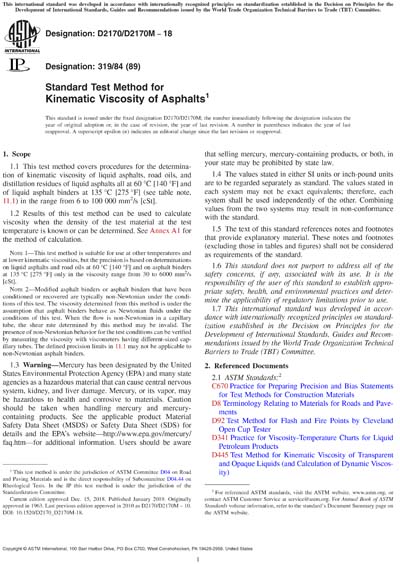Historical
ASTM D2170/D2170M-18
Standard Test Method for Kinematic Viscosity of Asphalts
1.1 This test method covers procedures for the determination of kinematic viscosity of liquid asphalts, road oils, and distillation residues of liquid asphalts all at 60 °C [140 °F] and of liquid asphalt binders at 135 °C [275 °F] (see table note, 11.1) in the range from 6 to 100 000 mm2/s [cSt].
1.2 Results of this test method can be used to calculate viscosity when the density of the test material at the test temperature is known or can be determined. See Annex A1 for the method of calculation.
Note 1: This test method is suitable for use at other temperatures and at lower kinematic viscosities, but the precision is based on determinations on liquid asphalts and road oils at 60 °C [140 °F] and on asphalt binders at 135 °C [275 °F] only in the viscosity range from 30 to 6000 mm2/s [cSt].
Note 2: Modified asphalt binders or asphalt binders that have been conditioned or recovered are typically non-Newtonian under the conditions of this test. The viscosity determined from this method is under the assumption that asphalt binders behave as Newtonian fluids under the conditions of this test. When the flow is non-Newtonian in a capillary tube, the shear rate determined by this method may be invalid. The presence of non-Newtonian behavior for the test conditions can be verified by measuring the viscosity with viscometers having different-sized capillary tubes. The defined precision limits in 11.1 may not be applicable to non-Newtonian asphalt binders.
1.3 Warning—Mercury has been designated by the United States Environmental Protection Agency (EPA) and many state agencies as a hazardous material that can cause central nervous system, kidney, and liver damage. Mercury, or its vapor, may be hazardous to health and corrosive to materials. Caution should be taken when handling mercury and mercury-containing products. See the applicable product Material Safety Data Sheet (MSDS) or Safety Data Sheet (SDS) for details and the EPA’s website—http://www.epa.gov/mercury/faq.htm—for additional information. Users should be aware that selling mercury, mercury-containing products, or both, in your state may be prohibited by state law.
1.4 The values stated in either SI units or inch-pound units are to be regarded separately as standard. The values stated in each system may not be exact equivalents; therefore, each system shall be used independently of the other. Combining values from the two systems may result in non-conformance with the standard.
1.5 The text of this standard references notes and footnotes that provide explanatory material. These notes and footnotes (excluding those in tables and figures) shall not be considered as requirements of the standard.
1.6 This standard does not purport to address all of the safety concerns, if any, associated with its use. It is the responsibility of the user of this standard to establish appropriate safety, health, and environmental practices and determine the applicability of regulatory limitations prior to use.
1.7 This international standard was developed in accordance with internationally recognized principles on standardization established in the Decision on Principles for the Development of International Standards, Guides and Recommendations issued by the World Trade Organization Technical Barriers to Trade (TBT) Committee.
ASTM International [astm]

